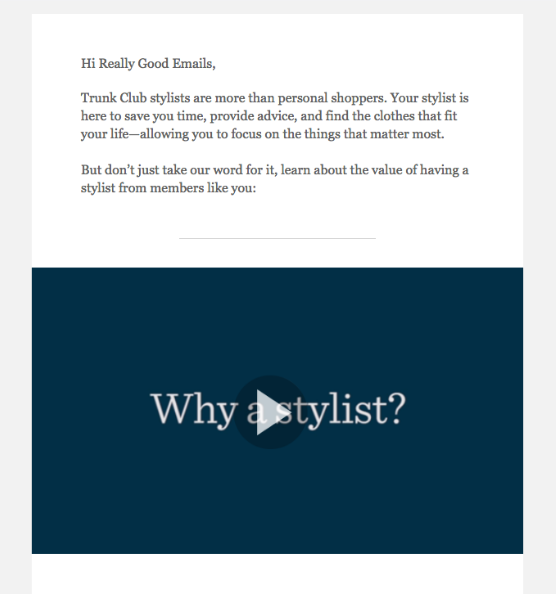This Is How To Use Customer Testimonials For Your Email Marketing
Using customer testimonials in email marketing can lead to more conversions and customer engagement. This article will provide insight into how to use customer testimonials to improve your email marketing efforts.

Most buyers that search for a product or service for the first time often have doubts in their minds. For this reason, they could end up asking some questions like "is this product a scam?" "Are there other people that have benefitted from this product or service?"
The truth is that when people want to make a purchase, they want to make sure that they make the right choice. So, their first line of action is to turn to other buyers.
This is where you can leverage the power of customer testimonials in your email marketing campaigns.
In this article, we'll explain some of the best practices for using customer testimonials in your email marketing efforts, so that you can increase sales and customer engagement.
We'll also highlight some examples of emails that show good use of testimonials in email marketing.
Table of contents
- Benefits of using customer testimonials in your email marketing campaigns
- Best practices for using customer testimonials in your email marketing campaigns
- Wrapping up
Benefits of using customer testimonials in your email marketing campaigns
In this section, we'll highlight some of the benefits of using customer testimonials in your email marketing efforts.
1. Build credibility and trust
Using customer testimonials in email marketing makes buyers gain more trust in your brand.
When a prospect watches a testimonial video or reads a well-written testimonial, they'll see your brand as trustworthy because they'll be hearing more about your brand from a buyer's point of view.
2. Increase in sales and conversions
A well-prepared customer testimonial entices buyers to convert and buy your product because they have more reasons to trust you.
3. Build long-term customer relationships
When customers trust your brand more, they're more likely to make repeat purchases. This results in building a long-term relationship with them.
4. Increase in customer engagement
Using customer testimonials in your emails leads to more customer engagement.
For instance, a video testimonial with an interesting story will make a customer spend more time watching it and even go as far as reading other testimonials.
Best practices for using customer testimonials in your email marketing campaigns
So far, we've explained some of the benefits of using customer testimonials in email marketing. Now, let's move on to the best ways you can apply testimonials in your emails.
1. Segment your email list
Before you begin to send testimonials to customers, you need to ensure that you send your emails to specific customers with similar attributes.
This involves segmenting your email list. Segmentation ensures that you send relevant and targeted emails to your customers. This way, you can send targeted emails to specific customers that purchased a specific product.
Without segmentation, you can end up sending random emails that won't connect with your customers on a personal level. So, ensure that you segment your email list for more targeted emails.
In this case, Engage enables you to create unique customer segments and send personalized messages to your customer base.
2. Personalize your use of testimonials
Another great benefit of segmentation is that it provides the opportunity to personalize your emails.
Personalization is an important part of your email marketing strategy that you shouldn't ignore. Studies have shown that 98% of marketers believe that personalization advances customer relationships.
The best way to apply personalization when using testimonials is by highlighting customer testimonials that relate to a specific customer demographic, purchase history, location or interest.
This process is more effective if you sell a range of products for different types of customers. The main idea is that customers are more likely to engage with testimonials from people like them.
3. Send video testimonials
Including video testimonials in your emails is a must-do if you want your customers to have more trust in your brand. The use of fake customer reviews is increasing greatly and consumers are aware of this.
This has led 68% of people to say that they would prefer to learn about a new product or service by watching a short video.
Rather than opting for promotional videos that only talk about your brand, you can include a recorded video of a real customer. This creates the chance for your target audience to connect with other customers on an emotional level.
In this case, Trunk Club uses a video testimonial well.

The video testimonial shows the benefits and results that people get from using the product. This kind of testimonial is more effective in building trust and convincing people to buy.
To apply this tactic, you can decide to collaborate with your customers and have them record where they provide an honest review of your product.
So when you include video testimonials, you know that you're making your customers happy and that they'll trust your brand even more.
4. Use testimonials to recover lost customers
There's nothing worse than losing a customer who nearly made a purchase. However, there's still a chance to win them back if you apply the right strategies.
In this case, you can send a cart abandonment email to remind the customer of the purchase and entice them to complete it.
To make your cart abandonment email more compelling, you can include customer testimonials. You can also apply this tactic in a re-engagement email series to entice lapsed customers to return to your brand.
Adding a compelling customer testimonial in your email would eliminate any doubt in the customer’s mind and convince them to buy from your brand.
5. Highlight the usefulness of your product
It's less effective to add a customer testimonial that doesn't reveal much about the usefulness of your product.
For example, a testimonial that says "great product" or "this is really good "will less likely convince a prospective buyer that your product will do any good.
Instead, opt for an in-depth testimonial that highlights how your product helped a specific customer overcome a challenge.
For instance, if you're selling stretch mark creams, you can include a testimonial from a pregnant woman who has observed a significant change in her skin because of your product.
6. Include different types of testimonials perspective
Using customer testimonials in emails presents a great way to combine different testimonial perspectives to make a good story.
For instance, you can include other forms of social proof to add to the credibility of your brand. This also makes customers feel more confident about buying from your brand.
Duolingo shows a great example of using extra social proof in its emails.

By highlighting that 350,000 teachers use Duolingo in the classroom, teachers will most likely think positively about the brand. It could make teachers think—Duolingo must be useful if so many others are using it.
This shows that data and numbers make for an irresistible form of social proof.
For instance, you can share how many products you have sold and the number of countries that you have sold them.
It's without a doubt that combining this form of social proof with customer testimonials will make your email offer more convincing.
7. Use testimonials to meet your business goals
The use of customer testimonials must be in line with the objectives of each email you send. In other words, you need to do more than collect a bunch of customer testimonials—ensure that they work for you.
Whether you're sending an upsell email, re-engagement email or welcome email, you need to consider the type of testimonials that would fit each email.
Wrapping Up
A well-prepared customer testimonial is a powerful marketing tool that can help you to gain credibility in your industry. They also increase conversions as they entice customers to buy from your brand.
So, don't hesitate to make them part of your email marketing strategy.
Here's a brief summary of the important points we've explained so far:
- Personalized testimonials resonate better. If you send emails with customer testimonials that match a specific buyer persona, buyers will relate more to them.
- Win-back lost customers. When you include customer testimonials in your card abandonment or re-engagement email series, you increase the likelihood of winning back lost customers.
- Highlight the usefulness of your product. Don't forget to use customer testimonials to show prospects how your product has helped a specific customer overcome a challenge.
Using a good customer testimonial as part of your email strategy will undoubtedly improve your marketing efforts.
At Engage, we have made this process less challenging for you. You can use our powerful email automation tool to include customer testimonials in your email marketing workflows.